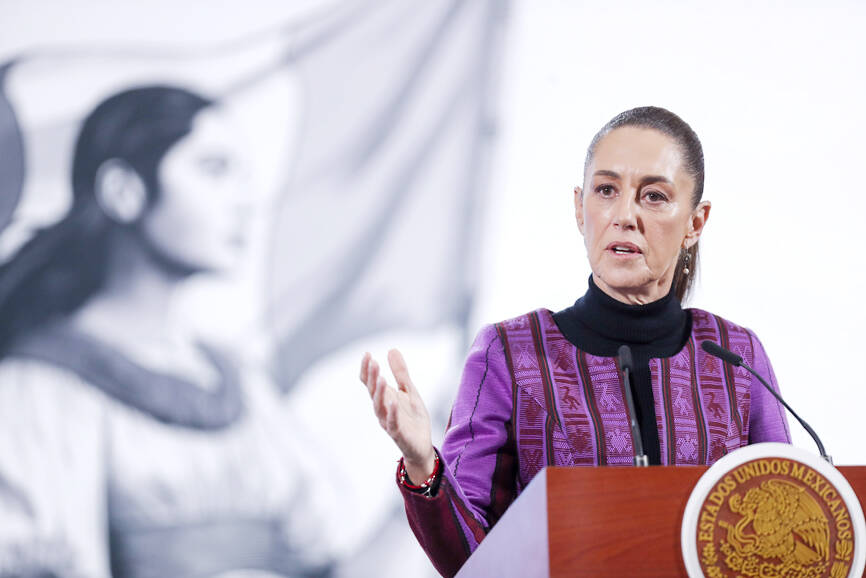US President Donald Trump’s administration told Mexican officials that they should put their own duties on Chinese imports as part of their efforts to avoid tariffs threatened by Trump, people familiar with the matter said.
US Secretary of Commerce Howard Lutnick was among US officials who conveyed that message at a meeting on Thursday last week in Washington with a Mexican delegation, including Mexican Secretary of Economy Marcelo Ebrard, the people said.
US Trade Representative nominee Jamieson Greer and National Economic Council director Kevin Hassett also attended the meeting.

Photo: EPA-EFE
Mexican President Claudia Sheinbaum has bolstered efforts to crack down on cheap imports from China, a move to support domestic industries as well as appease a Trump administration that is threatening 25 percent tariffs on its North American trade partners.
Mexico did not make any commitments on China during the meeting, which ended with an agreement to establish a working group from the two countries to continue exploring trade and tariff issues, the people said.
The Washington meeting was the start of “a constructive dialogue, and joint work would begin on Monday,” Ebrard said in a post on X.
Trump has demanded Mexico and Canada do more to restrict the flow of migrants and fentanyl into the US or face 25 percent tariffs.
Originally set for Feb. 1, the White House delayed implementing those duties for a month. Meanwhile, the US imposed an additional 10 percent tariff on all imports from China.
Separately, Australian Treasurer Jim Chalmers said he would be traveling to Washington later yesterday, as the US ally presses its case to be excluded from tariffs.
“Trade and tariffs will be part of the conversation, but not the whole conversation,” Chalmers said on Australian Broadcasting Corp’s Insiders program.
He said he plans to meet with US Secretary of the Treasury Scott Bessent and to highlight areas of economic partnership, including the large investments made in the US by Australia’s US$2.6 trillion pension industry.
While Trump earlier this month agreed to consider an exemption for Australia from tariffs on steel and aluminum, Senior Counselor to the President for Trade and Manufacturing Peter Navarro quickly threw that into doubt, saying that Australia was “killing” the US aluminum market.
“I don’t expect to conclude those discussions on steel and aluminum while I’m in DC,” Chalmers said. “But whether it’s the flow of capital or critical minerals and trade, there’s lots to talk about.”
Chalmers said he would also address the Australian Superannuation Investment Summit, which is being held in the US capital. Large Australian funds invest about one in five dollars of members’ retirement savings in the US, according to a statement issued collectively by representatives attending the event.

BIG BUCKS: Chairman Wei is expected to receive NT$34.12 million on a proposed NT$5 cash dividend plan, while the National Development Fund would get NT$8.27 billion Taiwan Semiconductor Manufacturing Co (TSMC, 台積電), the world’s largest contract chipmaker, yesterday announced that its board of directors approved US$15.25 billion in capital appropriations for long-term expansion to meet growing demand. The funds are to be used for installing advanced technology and packaging capacity, expanding mature and specialty technology, and constructing fabs with facility systems, TSMC said in a statement. The board also approved a proposal to distribute a NT$5 cash dividend per share, based on first-quarter earnings per share of NT$13.94, it said. That surpasses the NT$4.50 dividend for the fourth quarter of last year. TSMC has said that while it is eager

‘IMMENSE SWAY’: The top 50 companies, based on market cap, shape everything from technology to consumer trends, advisory firm Visual Capitalist said Taiwan Semiconductor Manufacturing Co (TSMC, 台積電) was ranked the 10th-most valuable company globally this year, market information advisory firm Visual Capitalist said. TSMC sat on a market cap of about US$915 billion as of Monday last week, making it the 10th-most valuable company in the world and No. 1 in Asia, the publisher said in its “50 Most Valuable Companies in the World” list. Visual Capitalist described TSMC as the world’s largest dedicated semiconductor foundry operator that rolls out chips for major tech names such as US consumer electronics brand Apple Inc, and artificial intelligence (AI) chip designers Nvidia Corp and Advanced

Saudi Arabian Oil Co (Aramco), the Saudi state-owned oil giant, yesterday posted first-quarter profits of US$26 billion, down 4.6 percent from the prior year as falling global oil prices undermine the kingdom’s multitrillion-dollar development plans. Aramco had revenues of US$108.1 billion over the quarter, the company reported in a filing on Riyadh’s Tadawul stock exchange. The company saw US$107.2 billion in revenues and profits of US$27.2 billion for the same period last year. Saudi Arabia has promised to invest US$600 billion in the US over the course of US President Donald Trump’s second term. Trump, who is set to touch

SKEPTICAL: An economist said it is possible US and Chinese officials would walk away from the meeting saying talks were productive, without reducing tariffs at all US President Donald Trump hailed a “total reset” in US-China trade relations, ahead of a second day of talks yesterday between top officials from Washington and Beijing aimed at de-escalating trade tensions sparked by his aggressive tariff rollout. In a Truth Social post early yesterday, Trump praised the “very good” discussions and deemed them “a total reset negotiated in a friendly, but constructive, manner.” The second day of closed-door meetings between US Secretary of the Treasury Scott Bessent, US Trade Representative Jamieson Greer and Chinese Vice Premier He Lifeng (何立峰) were due to restart yesterday morning, said a person familiar